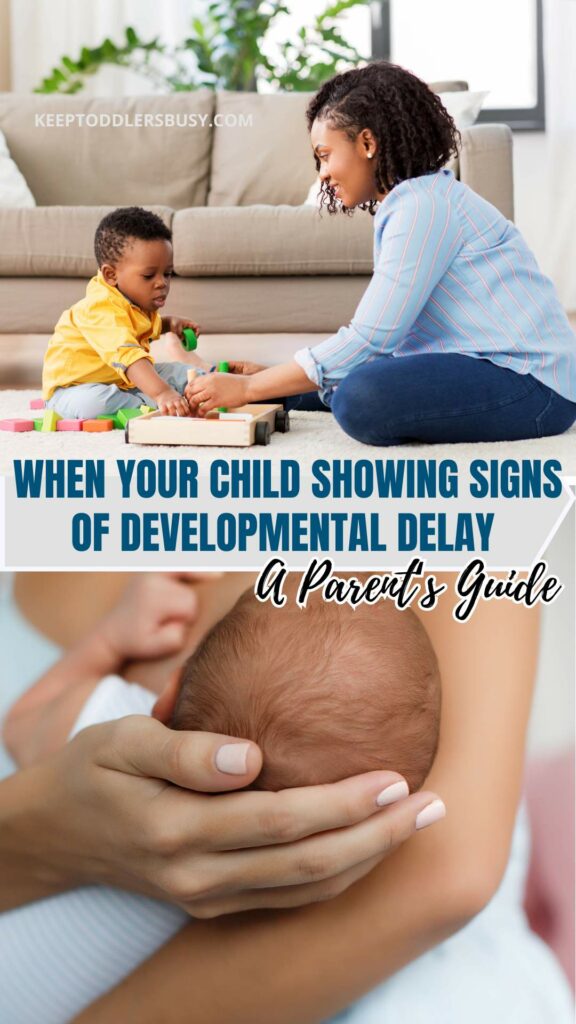
Steps To Take When You Notice Signs of Developmental Delay
As parents, we all want nothing but the best for our children. Some aspects of parenting absolutely come naturally, but it often takes gaining some insight from others and maybe even some extra research to make the best decisions for our little ones.
Noticing that your child might be experiencing developmental delays can be concerning and overwhelming. At these times, it can be crucial to take proactive steps to support your child’s growth and well-being.
This post will walk through and guide you through some essential steps to take if you notice that your child is showing signs of developmental delay.

Signs of Developmental Delay: Step We Can Take
Recognize The Different Signs
My motto is always “Don’t Wait”. Early identification is is often key, and there are multiple sources available to provide a general milestones to watch out for as your child grows. While the range of what is typical can widely vary, general signs to keep an eye out for can be delayed speech, difficulty in social interactions, and trouble with motor skills, for example.
Every child develops at their own pace, but significant delays in reaching milestones could indicate a need for further evaluation. Keeping up with a general understanding of signs and milestones can help you take immediate action sooner, if necessary.
Consult Your Child’s Pediatrician
I believe it’s best to go with your gut feeling, you know your child best. If your little one is not meeting some of the age- appropriate milestones , or you notice other areas of concern, schedule an appointment to discuss these concerns with your child’s pediatrician.
They will perform initial screenings throughout your child’s growing years (such as child development assessment Singapore tests) and refer you to specialists if needed. Open communication with your doctor is vital in understanding your child’s development.
During the appointment, be prepared to discuss your child’s medical history, developmental milestones, and any specific behaviors that concern you. The pediatrician might use standardized screening tools to assess your child’s development. If they identify potential delays, they will guide you on the next steps needed.
Take Advantage of Early Intervention
Early intervention can make a significant difference in your child’s development going forward. According to the Center for Disease Control (CDC), “Intervention is likely to be more effective when it is provided earlier in life rather than later.”1
Early intervention services are critical for families so parents understand how best to meet the needs of a developmentally delayed child and get the support services that they need to advocate for their children. These services offer support and therapies designed to address developmental delays
Examples of services can include speech therapy, occupational therapy, physical therapy, etc.
Active participation in therapies and activities is can also be very beneficial. Consistency and repetition are key components of developmental progress. Starting with play can be a great way to get the ball rolling. Play helps children learn life skills, solve problems, improve motor skills, and so many of major benefits!
Have A Personalized Treatment Plan For Your Kiddo
Work with professionals to develop an individualized plan tailored to your child’s needs, whether is private care or through your local school system. This plan should outline specific goals, therapies, and strategies to support your child’s development. Regularly review and adjust the plan as your young one progresses.
Often, in the phase, parents opt to consult with an advocate to make sure that the individual plan in both appropriate and beneficial for their child.

Educate Yourself And Others
Try to keep in mind that the knowledge you gain that enables you to better understand your child and how they can be helped can make a huge difference. Learn about developmental delays, therapeutic techniques, and any and all available resources.
Books, professionals, online courses, and support groups can provide valuable information and support. The more you know, the better equipped you’ll be to help your child.
By educating yourself, not only can you can better understand your child’s needs and advocate for appropriate services and support, but you can also teach other family members and friends, when necessary, about your child and how they can help.
Set Up A Support System
Parents of children with developmental delays can often face unique challenges, and not all of these challenges may be observed or noticeable by people that you come into contact with on a daily basis.
With knowledge and acceptance on your side, surround yourself with as much supportive family, friends, and professionals as possible can have an enormously positive affect on you and your child’s day to day life.
Joining support groups for parents in similar situations can offer emotional support and practical advice as well.
Be Your Childs’s Top Advocate
Be your child’s strongest advocate. Through knowledge, openness, and the desire to create the best atmosphere, be fearless in communicating your child’s needs effectively with teachers, therapists, and other professionals involved in your child’s care.
Ensure that they are receiving the support they need in all settings, including school, private practices, and community programs. Your advocacy efforts can make a significant difference in ensuring your child receives the services and support they need to thrive.

Keep An Eye On Your Child’s Development Progress
Regularly monitor your child’s progress and adjust strategies as needed. Don’t be afraid to address concerns with progress if necessary. However, it’s also important to celebrate small victories and remain patient during setbacks as well. Consistent tracking will help you see how far your child has come and what areas still need attention.
Keep a journal or log of your child’s progress, noting any improvements, challenges, and changes in behavior. Regularly review this information with your child’s team of professionals to make informed decisions about adjustments to their plan.
Remember that progress may be slow and incremental, but every step forward is a step in the right direction. Celebrate your child’s achievements, no matter how small, and stay positive and hopeful.
Foster A Positive Environment For Your Child
I think it is important to also enjoy and appreciate your child for who they are RIGHT NOW 🙂 Create a nurturing and encouraging environment at home. Positive reinforcement, play, and praise can boost your child’s confidence and motivation. Encourage social interactions and playtime with peers to develop social skills.
Some ways to foster a positive environment include but are not limited to providing LOTS OF PLAY, consistent routines, offering choices, using positive reinforcement, and so on. Speak with your doctor and therapists for techniques and ideas that will benefit your child!
At the end of the day, a supportive and loving home environment can help your child feel confident and motivated to learn and grow.
Don’t Forget About Yourself
Unique challenges can often come with a tireless focus on goals, progress, and the well-being of our little ones on a day-to-day basis. But we can’t forget about our own well-being.
Make time for self-care and reach out for help if you’re feeling overwhelmed. A healthy and happy parent is better equipped to support their child.
Self-care can simply include but are not limited to things like taking breaks, engaging in hobbies, seeing a movie, or just having some help in the house.
By taking care of yourself, you’ll be better prepared to meet the challenges of parenting a child with developmental delays and provide the best possible support for your child’s development.
When your child shows signs of developmental delay, taking prompt and proactive actions is important. By recognizing the signs, consulting professionals, seeking early intervention, and creating a supportive environment, you can significantly impact your kid’s growth and development. Dear parents, don’t worry – you’ve got this!!
References
The Importance of Early Intervention for Infants and Toddlers with Disabilities and Their Families [1.19 MB, 2 Pages] Accessed February 26, 2015.
Welcome to my blog! I am an activity mom of three and I have over 15 years of experience crafting, writing, designing and creating. My mission is to bring fun, balance and learning to your busy homes with activities, tips, inspiration, and organization!






